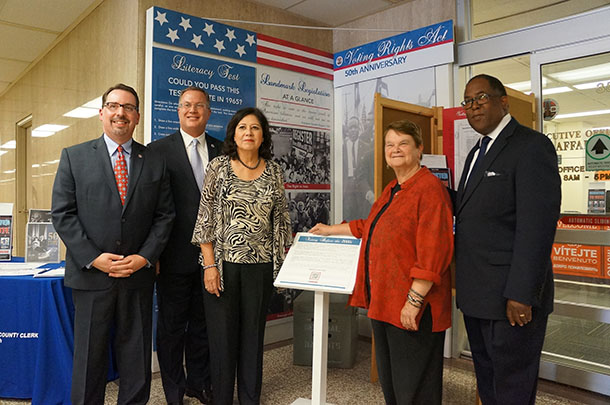
(Photo Credit: Lu Lu, Los Angeles County Registrar-Recorder/County Clerk)
August 6 marks the 50-year anniversary of the signing of the Voting Rights Act by President Lyndon B. Johnson. The Act has been called the most powerful civil rights statute in American history, and though trimmed by recent court decisions, it remains vital still. It reaffirms our faith that more equitable self-governance is the best way to bend the arc of the moral universe toward justice.
On this golden jubilee, the 1965 Act demands and deserves not only reverence but renewed commitment.
Just don’t forget its younger sibling.
You see, August 6 also marks a 40-year anniversary of the VRA, version 2.0. For millions of Americans, this milestone is every bit as important as the 1965 original.
In 1975, Congress amended — and significantly upgraded — the Act. The 1975 statute made the ban on abusive and arbitrary “literacy” and “character” tests permanent and nationwide. It created incentives for regular citizens to enforce the Act, rather than waiting for the government. It created special federal oversight for Alaska, Arizona, and Texas, among others, and affirmed special oversight for Brooklyn and the Bronx, where discrimination meant less than 50% turnout: in a system of majority rule, the majority was entirely absent from the polls.
Perhaps most important, the 1975 amendments to the Act made American democracy multilingual. That is, the 1975 Act made American elections more closely reflect the American people.
Congress determined that “voting discrimination against citizens of language minorities is pervasive and national in scope,” and that such citizens “have been effectively excluded from participation in the electoral process.” So Congress prohibited discrimination at the polls against American citizens solely because of how they communicate. It also required voting materials — instructions, guides, ballots — to be made available in the languages that sizable local communities speak and mandated bilingual support at the polls in those communities.
This protection recognized a vision of America – and her electorate – that is multi-cultural and diverse. It recognized that the first inhabitants spoke a variety of languages; that the first European immigrants spoke Spanish, well before Jamestown was founded; and that the nation has prospered as individuals from around the globe have for hundreds of years brought both their talent and their culture to our country.
Today, the largest populations served by these provisions speak Spanish. However, the last Census showed there are significant concentrations of citizens who primarily speak Athabascan, Bangladeshi, Chinese, Choctaw, Filipino, Hindi, Hopi, Inupiat, Japanese, Khmer, Kickapoo,
Korean, Navajo, Pueblo, Tohono ’O’Odham, Vietnamese, Yaqui, Yuma, or Yup’ik. The 1975 Act also allows those Americans to better engage in their democracy.
The list and the locations change as American society changes — it was different in 2000 and will be different in 2020. In 2010, it included 248 jurisdictions nationwide, serving communities in states like Alaska, California, and New York, yes, but also communities in states like Connecticut, Kansas, Mississippi, Utah, and Washington. Look at where the U.S. Department of Justice has brought recent action under the Act, and you’ll likely see some surprises.
This litigation reveals another truth: there have been lapses, and in some places, lapses continue. Moreover, in the course of time, new issues arise. Today, access to voting can be limited by time and distance in ways that may not have been significant 40 and 50 years ago. Too often, translated election materials and the allocation of bilingual poll workers are inadequate to meet usability standards and expectations aligned to requirements outlined in the Act. The coming anniversary should remind us of the need to double down on compliance. And it also serves as a call to action, to remain vigilant in promoting the voting franchise for all eligible Americans.
We live and work in Los Angeles, the largest “local” election jurisdiction in the country, and one of the most diverse. Los Angeles County supports the 1975 Act by attempting to not only meet but exceed its requirements: materials or support are also available in Armenian, Bengali, Gujarati, Russian, and Thai, to serve the local population. Given detailed voting instructions, and the complexity of local ballot initiatives, there is simply no substitute for primary language. With a new 21st-century voting system on the horizon, we are striving to make language access more robust still. And there is much work yet to be done.
Moving forward on August 6 means living up to these past commitments: both the seismic achievement of the 1965 Voting Rights Act and its 1975 upgrade. We best honor this history by working to embrace every eligible American in the voting process. And as citizens, we best honor this history by registering and casting our ballots, for each and every election — and then helping others to do the same.
Let us celebrate the Voting Rights Act by proudly declaring, “I Voted!” — in whatever language we wish.
Dean Logan is the Registrar-Recorder/County Clerk of Los Angeles and the county’s chief election official. Justin Levitt is an election expert and law professor at Loyola Law School, Los Angeles.

